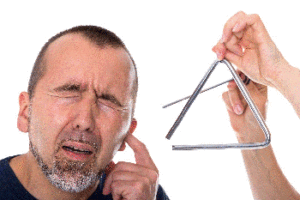Do you have constant buzzing or ringing in your ears or head?
Tinnitus affects up to 15% of the population.
Yet there is a persistent myth that nothing can be done to treat it.
Tinnitus is characterised by noises heard in the ear or head, and for a minority of sufferers is extremely bothersome. It can be caused by a medical condition, side effect of medication or more commonly by blockages or deficits in the hearing system. This could include something as simple as wax in your ears, infection in the ear or permanent hearing loss.
What is ‘normal tinnitus’? Just about everyone gets occasional ringing in their ears. It usually lasts a minute or two and occurs once or twice a month. Many people also experience ‘nightclub tinnitus’ -ringing after a night out in a loud environment. This is a warning sign that the environment was loud enough to cause damage to your hearing. This tinnitus should resolve within a day or two. If not, see your GP or get your hearing tested.
If you have Tinnitus what should you do?
- Tell your GP – he/she may be aware that medication or a medical condition is linked to Tinnitus
- Get your hearing tested by an Audiologist, ideally a full diagnostic test which explores all three parts of your ears
- Wear hearing aids if you have hearing loss. Around 80% of people with Tinnitus find wearing hearing aids helps decrease the level of the Tinnitus.
- Try out different ‘masking’ signals and see what works best for you. Either listen via headphones or through a speaker/radio. Try some of the free Tinnitus apps on your smartphone app store, especially the ones made by the hearing aid manufacturers (Oticon, ReSound and WIdex have good ones). You can try music, nature sounds and static-type noise and see what helps. Ideally set the level of the masking noise so your tinnitus is just noticeable. This helps re-train your brain to ignore the tinnitus.
- Try to think of your Tinnitus as a stress-monitor. Many people find their Tinnitus gets worse when they are stressed, tired or need a break. If you have a bad day with your Tinnitus – do something relaxing. Go for a walk, have a massage, take care of yourself and try to get some sleep.
- If your Tinnitus is really bothering you, keeping you from sleeping or interfering with your daily life, ask your GP for a referral for counselling or Bio-feedback (a technique that teaches you to re-frame how you think about your Tinnitus).
Lastly, if you have Tinnitus, don’t despair. There are things that can help and everyone is different. Decades of research are starting to find some really interesting information about Tinnitus mechanisms, causes and solutions.
Read also Teresa’s article Getting Your Hearing Aids Ready for Summer.
Contributed by Dr Teresa Burns, AuD, MA, BSc (Hons), Dip (Business), Audiologist and Director of Teresa Burns Hearing, located on Auckland’s North Shore. Teresa has been an Audiologist for over 20 years and is passionate about providing world class hearing services in a locally owned, friendly, independent clinic environment. She offers full diagnostic hearing evaluations, hearing aids and specialist Tinnitus consultations https://www.teresaburnshearing.co.nz/






I have tinnitus due to hearing loss in one ear. I was initially quite stressed by it but decided that was a waste of time so I gradually came to terms with it. Also I heard that some people in the Pacific islands regard such noise as a ‘blessing’ so perhaps if people are bothered by tinnitus they could bear this in mind!
Re-framing one’s mindset about things that can’t be changed is fantastic advice! Although, Teresa does say that there are steps people can take to help with tinnitus. thank you for your helpful comment.
I read this article on tinnitus with great interest! I dont suffer ringing in the ears, but hear music instead! Mostly it isnt to bothersome. If the tune isnt one I wish to hear, I can change to a tune I enjoy! I dont notice it when socialising or watching television, I have largely learned to ignore it. ( I wear Hearing Aids due to impaired hearing) Thank you for all the helpful information given, its comforting to realise one is not alone with this problem!
I’ve had tinnitus for 12 years. It is always “there” but I am not aware of it unless it’s quiet and something brings it to my attention, and then there’s no turning it off. I have found the best strategy is to pay it as little attention as possible; any strategy to actually get RID of it just means I’m thinking “is this strategy working? Can I hear it now” and of course the answer is “yes”. Thankfully it’s not so loud it keeps me up at night.
Excellent strategy – thank you for sharing it with others.